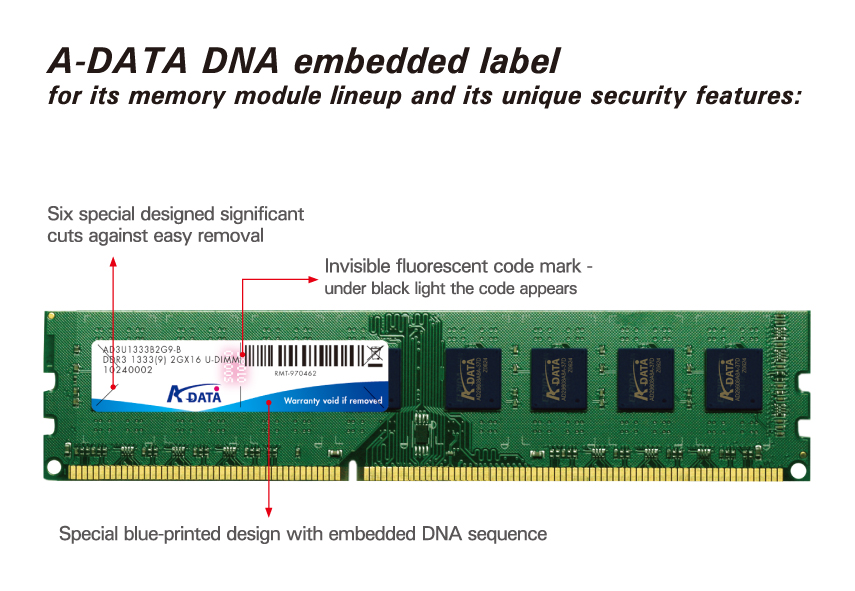A-DATA Using ''DNA Authentication'' to ID RAM
A-DATA is forced to use an invisible numbering system on all of its DRAM modules.
A-DATA Technology said today that it now must use what it calls a DNA authentication technology in all of its standard DRAM modules thanks to problematic counterfeiting and fraud, a "serious and growing problem" in the DRAM industry, according to the company. A-DATA said that the authentication technology--while not using real DNA--will embed an invisible sequence of a unique DNA into the product label, not the actual DRAM module.
"As a leading manufacturer of DRAM module in the industry, A-DATA is committed to offer the highest quality of DRAM module and solution to the consumers," said Gibson Chen, Vice President and Head of Product Management Division. "Thus, we adopted the DNA authentication technology to protect our intellectual property and our consumers’ interests."
So what does DNA authentication mean to the consumer? This guarantees a true A-DATA product, and not a fake DRAM module stamped with A-DATA's logo. To verify the chip's authenticity, consumers and retailers can simply use a black light pen that will light up the DNA's fluorescent coding. The label itself also utilizes "special designed significant cuts" that keeps counterfeiters from removing it easily.
While this implementation of authentication is interesting, it will only be a matter of time before counterfeiters figure out a way around the new system.
Get Tom's Hardware's best news and in-depth reviews, straight to your inbox.

Kevin Parrish has over a decade of experience as a writer, editor, and product tester. His work focused on computer hardware, networking equipment, smartphones, tablets, gaming consoles, and other internet-connected devices. His work has appeared in Tom's Hardware, Tom's Guide, Maximum PC, Digital Trends, Android Authority, How-To Geek, Lifewire, and others.
-
liquid0h You know when the new U.S $20's came out they were forged in a week. I wonder how long it will take for this?Reply -
stumpystumped producing counterfeit notes costs significantly less than the note values. highly doubt counterfeiting RAM would be as profitable.Reply -
cybrcatter ptroenSounds like a oligopoly practice to keep the ram prices from falling.How is protecting brand identity an ologopolisitc practice?Reply
Besides, of all the PC component markets, ram is one of the most competitive. PC technology in general(hardware, not software) are very price competitive, even amongst duopolies such as AMD/Intel or AMD/Nvidia.
I can get a GPU today for $100 that would have cost me more than three times that two years ago.
-
acecombat TomsTo verify the chip's authenticity, consumers and retailers can simply use a black light pen that will light up the DNA's fluorescent coding.Reply
Ohh blacklight ink, that's only been around for years, that's gonna be hard to duplicate. /sarcasm
-
It's not like you have a blue light in the store (or at online shops) to test it out..Reply
Most RAM I've purchased worked perfectly fine!
I guess the issue lies more with the faster than DDR2 800 Mhz modules, which often are overclocked ones...
